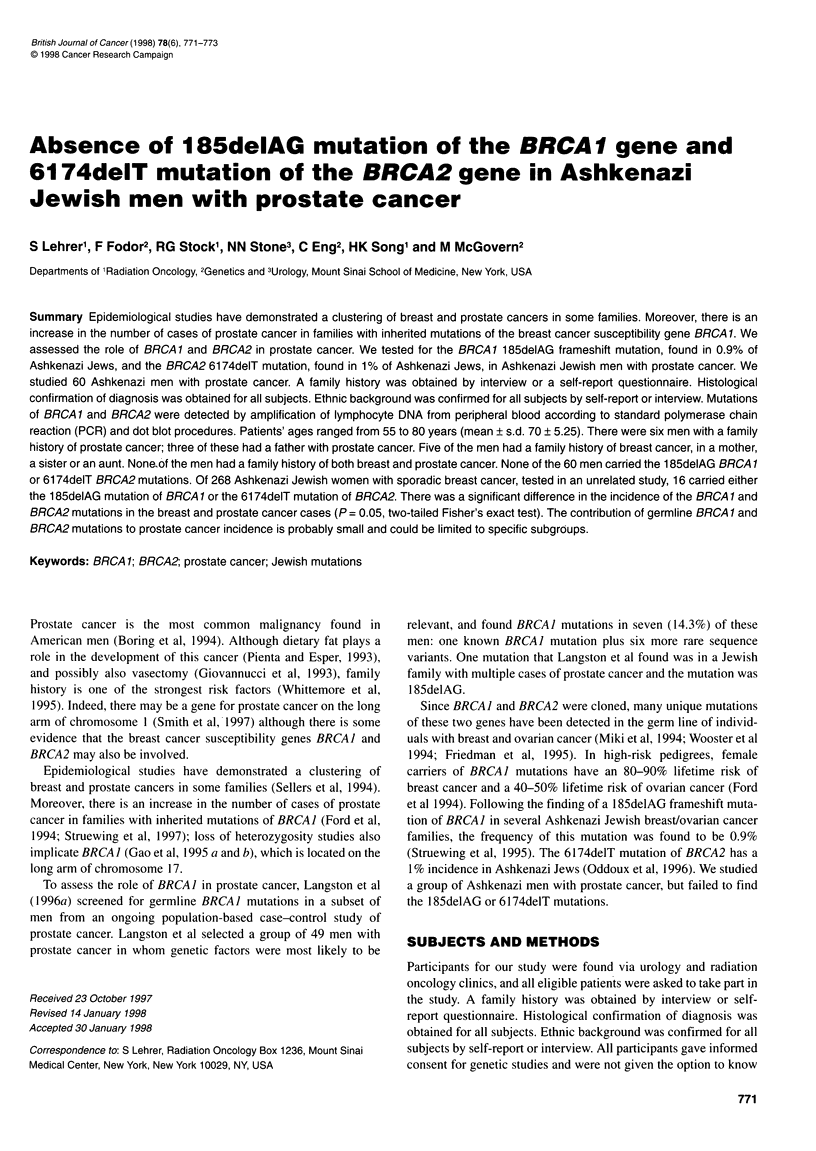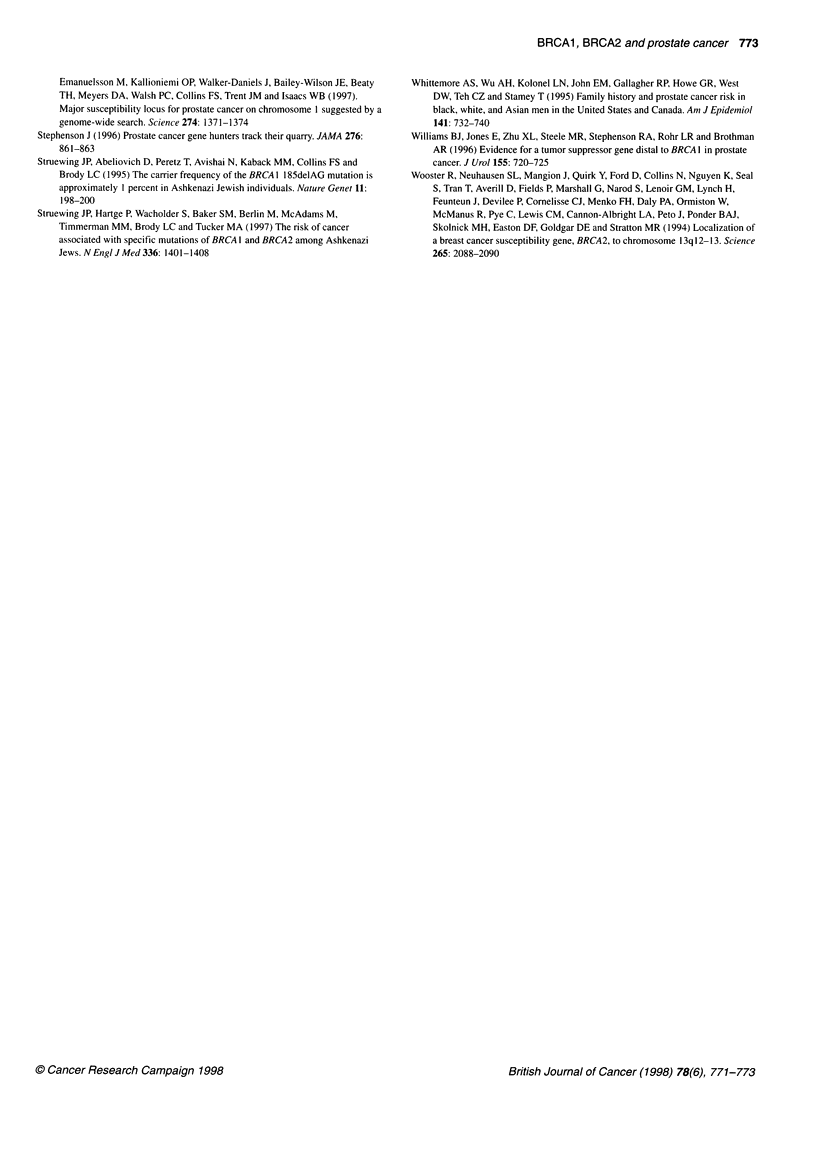Abstract
Epidemiological studies have demonstrated a clustering of breast and prostate cancers in some families. Moreover, there is an increase in the number of cases of prostate cancer in families with inherited mutations of the breast cancer susceptibility gene BRCA1. We assessed the role of BRCA1 and BRCA2 in prostate cancer. We tested for the BRCA1 185delAG frameshift mutation, found in 0.9% of Ashkenazi Jews, and the BRCA2 6174delT mutation, found in 1% of Ashkenazi Jews, in Ashkenazi Jewish men with prostate cancer. We studied 60 Ashkenazi men with prostate cancer. A family history was obtained by interview or a self-report questionnaire. Histological confirmation of diagnosis was obtained for all subjects. Ethnic background was confirmed for all subjects by self-report or interview. Mutations of BRCA1 and BRCA2 were detected by amplification of lymphocyte DNA from peripheral blood according to standard polymerase chain reaction (PCR) and dot blot procedures. Patients' ages ranged from 55 to 80 years (mean +/- s.d. 70 +/- 5.25). There were six men with a family history of prostate cancer; three of these had a father with prostate cancer. Five of the men had a family history of breast cancer, in a mother, a sister or an aunt. None of the men had a family history of both breast and prostate cancer. None of the 60 men carried the 185delAG BRCA1 or 6174delT BRCA2 mutations. Of 268 Ashkenazi Jewish women with sporadic breast cancer, tested in an unrelated study, 16 carried either the 185delAG mutation of BRCA1 or the 6174delT mutation of BRCA2. There was a significant difference in the incidence of the BRCA1 and BRCA2 mutations in the breast and prostate cancer cases (P = 0.05, two-tailed Fisher's exact test). The contribution of germline BRCA1 and BRCA2 mutations to prostate cancer incidence is probably small and could be limited to specific subgroups.
Full text
PDF


Selected References
These references are in PubMed. This may not be the complete list of references from this article.
- Boring C. C., Squires T. S., Tong T., Montgomery S. Cancer statistics, 1994. CA Cancer J Clin. 1994 Jan-Feb;44(1):7–26. doi: 10.3322/canjclin.44.1.7. [DOI] [PubMed] [Google Scholar]
- Eastman P. Search for prostate cancer gene sites may succeed in 1996. J Natl Cancer Inst. 1996 Jul 17;88(14):952–953. doi: 10.1093/jnci/88.14.952. [DOI] [PubMed] [Google Scholar]
- FitzGerald M. G., MacDonald D. J., Krainer M., Hoover I., O'Neil E., Unsal H., Silva-Arrieto S., Finkelstein D. M., Beer-Romero P., Englert C. Germ-line BRCA1 mutations in Jewish and non-Jewish women with early-onset breast cancer. N Engl J Med. 1996 Jan 18;334(3):143–149. doi: 10.1056/NEJM199601183340302. [DOI] [PubMed] [Google Scholar]
- Ford D., Easton D. F., Bishop D. T., Narod S. A., Goldgar D. E. Risks of cancer in BRCA1-mutation carriers. Breast Cancer Linkage Consortium. Lancet. 1994 Mar 19;343(8899):692–695. doi: 10.1016/s0140-6736(94)91578-4. [DOI] [PubMed] [Google Scholar]
- Friedman L. S., Szabo C. I., Ostermeyer E. A., Dowd P., Butler L., Park T., Lee M. K., Goode E. L., Rowell S. E., King M. C. Novel inherited mutations and variable expressivity of BRCA1 alleles, including the founder mutation 185delAG in Ashkenazi Jewish families. Am J Hum Genet. 1995 Dec;57(6):1284–1297. [PMC free article] [PubMed] [Google Scholar]
- Gao X., Zacharek A., Grignon D. J., Sakr W., Powell I. J., Porter A. T., Honn K. V. Localization of potential tumor suppressor loci to a < 2 Mb region on chromosome 17q in human prostate cancer. Oncogene. 1995 Oct 5;11(7):1241–1247. [PubMed] [Google Scholar]
- Gao X., Zacharek A., Salkowski A., Grignon D. J., Sakr W., Porter A. T., Honn K. V. Loss of heterozygosity of the BRCA1 and other loci on chromosome 17q in human prostate cancer. Cancer Res. 1995 Mar 1;55(5):1002–1005. [PubMed] [Google Scholar]
- Giovannucci E., Tosteson T. D., Speizer F. E., Ascherio A., Vessey M. P., Colditz G. A. A retrospective cohort study of vasectomy and prostate cancer in US men. JAMA. 1993 Feb 17;269(7):878–882. [PubMed] [Google Scholar]
- Isaacs S. D., Kiemeney L. A., Baffoe-Bonnie A., Beaty T. H., Walsh P. C. Risk of cancer in relatives of prostate cancer probands. J Natl Cancer Inst. 1995 Jul 5;87(13):991–996. doi: 10.1093/jnci/87.13.991. [DOI] [PubMed] [Google Scholar]
- Langston A. A., Malone K. E., Thompson J. D., Daling J. R., Ostrander E. A. BRCA1 mutations in a population-based sample of young women with breast cancer. N Engl J Med. 1996 Jan 18;334(3):137–142. doi: 10.1056/NEJM199601183340301. [DOI] [PubMed] [Google Scholar]
- Miki Y., Swensen J., Shattuck-Eidens D., Futreal P. A., Harshman K., Tavtigian S., Liu Q., Cochran C., Bennett L. M., Ding W. A strong candidate for the breast and ovarian cancer susceptibility gene BRCA1. Science. 1994 Oct 7;266(5182):66–71. doi: 10.1126/science.7545954. [DOI] [PubMed] [Google Scholar]
- Oddoux C., Struewing J. P., Clayton C. M., Neuhausen S., Brody L. C., Kaback M., Haas B., Norton L., Borgen P., Jhanwar S. The carrier frequency of the BRCA2 6174delT mutation among Ashkenazi Jewish individuals is approximately 1%. Nat Genet. 1996 Oct;14(2):188–190. doi: 10.1038/ng1096-188. [DOI] [PubMed] [Google Scholar]
- Pienta K. J., Esper P. S. Risk factors for prostate cancer. Ann Intern Med. 1993 May 15;118(10):793–803. doi: 10.7326/0003-4819-118-10-199305150-00007. [DOI] [PubMed] [Google Scholar]
- Sellers T. A., Potter J. D., Rich S. S., Drinkard C. R., Bostick R. M., Kushi L. H., Zheng W., Folsom A. R. Familial clustering of breast and prostate cancers and risk of postmenopausal breast cancer. J Natl Cancer Inst. 1994 Dec 21;86(24):1860–1865. doi: 10.1093/jnci/86.24.1860. [DOI] [PubMed] [Google Scholar]
- Smith J. R., Freije D., Carpten J. D., Grönberg H., Xu J., Isaacs S. D., Brownstein M. J., Bova G. S., Guo H., Bujnovszky P. Major susceptibility locus for prostate cancer on chromosome 1 suggested by a genome-wide search. Science. 1996 Nov 22;274(5291):1371–1374. doi: 10.1126/science.274.5291.1371. [DOI] [PubMed] [Google Scholar]
- Stephenson J. Prostate cancer gene hunters track their quarry. JAMA. 1996 Sep 18;276(11):861–863. [PubMed] [Google Scholar]
- Struewing J. P., Abeliovich D., Peretz T., Avishai N., Kaback M. M., Collins F. S., Brody L. C. The carrier frequency of the BRCA1 185delAG mutation is approximately 1 percent in Ashkenazi Jewish individuals. Nat Genet. 1995 Oct;11(2):198–200. doi: 10.1038/ng1095-198. [DOI] [PubMed] [Google Scholar]
- Struewing J. P., Hartge P., Wacholder S., Baker S. M., Berlin M., McAdams M., Timmerman M. M., Brody L. C., Tucker M. A. The risk of cancer associated with specific mutations of BRCA1 and BRCA2 among Ashkenazi Jews. N Engl J Med. 1997 May 15;336(20):1401–1408. doi: 10.1056/NEJM199705153362001. [DOI] [PubMed] [Google Scholar]
- Whittemore A. S., Wu A. H., Kolonel L. N., John E. M., Gallagher R. P., Howe G. R., West D. W., Teh C. Z., Stamey T. Family history and prostate cancer risk in black, white, and Asian men in the United States and Canada. Am J Epidemiol. 1995 Apr 15;141(8):732–740. doi: 10.1093/oxfordjournals.aje.a117495. [DOI] [PubMed] [Google Scholar]
- Williams B. J., Jones E., Zhu X. L., Steele M. R., Stephenson R. A., Rohr L. R., Brothman A. R. Evidence for a tumor suppressor gene distal to BRCA1 in prostate cancer. J Urol. 1996 Feb;155(2):720–725. [PubMed] [Google Scholar]
- Wooster R., Neuhausen S. L., Mangion J., Quirk Y., Ford D., Collins N., Nguyen K., Seal S., Tran T., Averill D. Localization of a breast cancer susceptibility gene, BRCA2, to chromosome 13q12-13. Science. 1994 Sep 30;265(5181):2088–2090. doi: 10.1126/science.8091231. [DOI] [PubMed] [Google Scholar]


